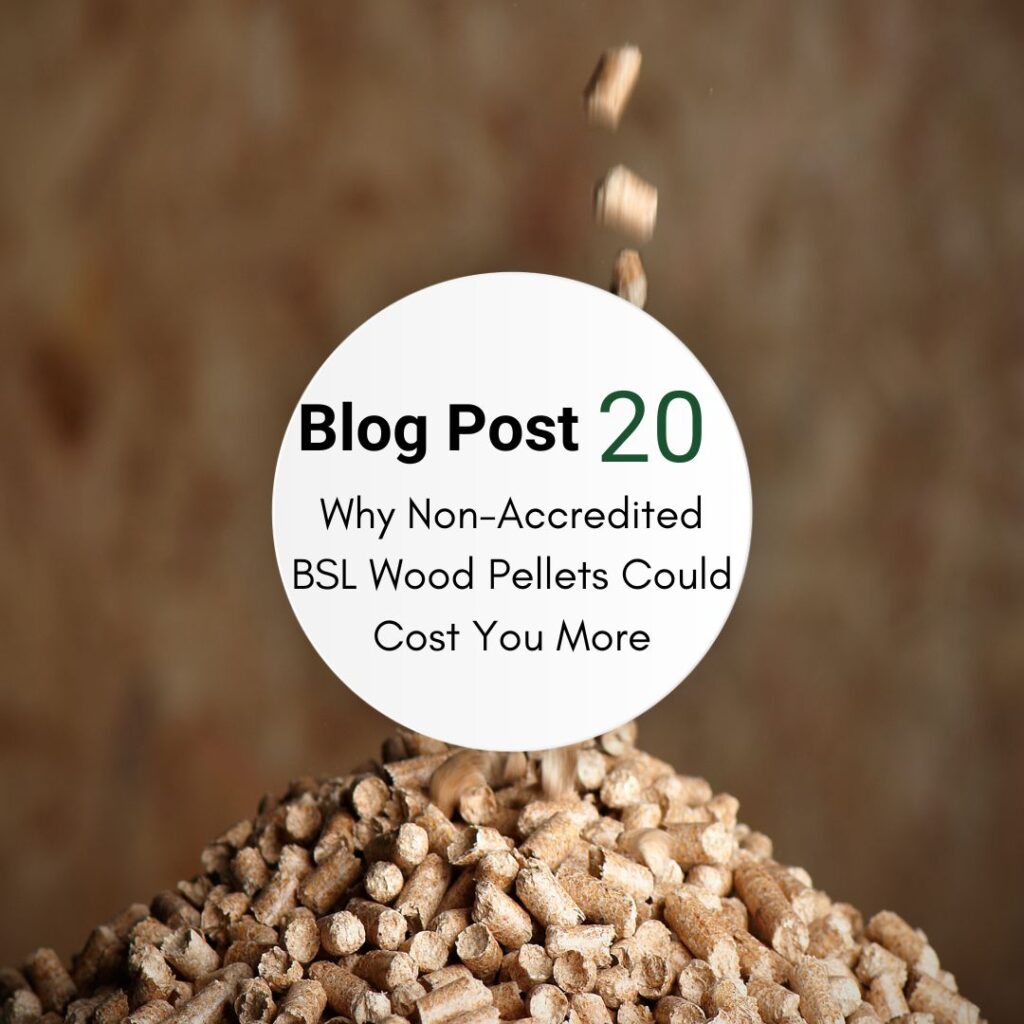Why Non-Accredited BSL Wood Pellets Could Cost You More Than You Think
In this blog, we explore the risks of using non-accredited BSL wood pellets in the UK, including how they can jeopardise Renewable Heat Incentive (RHI) payments and lead to serious legal consequences for non-compliance or fraud. We highlight the importance of choosing accredited pellets, such as those certified by BSL, En Plus A1, and Woodsure, to ensure traceability, quality, and sustainability. Discover how to verify your supplier’s compliance and why SDL Pellets provides a reliable, accredited solution to protect your heating system and secure your RHI payments.
When it comes to heating your home or business with biomass wood pellets, staying compliant with regulations is essential. This is especially important for those who are claiming RHI payments. Yet, there’s a growing issue impacting the UK in a big way: non-accredited BSL pellets. Often wood pellet traders are unaware, or not as forthcoming as they should be with their BSL certifications. While they might seem like a cost-saving choice initially, the risks they bring could leave you facing severe consequences that far outweigh the short term gains.
To help inform you and make sure your equipped with the correct information, we’ll dive into what non-accredited BSL pellets are, why they’re a problem, and how using them could jeopardise your Renewable Heat Incentive (RHI) payments – and much more.

What Are Non-Accredited BSL Wood Pellets?
Non-accredited BSL (Biomass Suppliers List) pellets are wood pellets that haven’t been verified for compliance with UK standards. Unlike accredited pellets, they often lack traceability, meaning you can’t be sure where they’ve come from or if they meet quality and sustainability standards.
Why does this matter? Without traceability:
- You don’t know what you’re burning: Non-compliant pellets may be made from low-grade materials, resulting in poor performance (a low BTU output) and potential damage to your boiler.
- You risk your RHI payments: If you’re claiming RHI payments, using non-compliant pellets could lead to payments being withheld or reclaimed.
The Consequences of Non-Compliance and Fraud
The rules around RHI payments are strict for good reason – they ensure sustainability and fairness within the market. Using non-compliant pellets, or worse, fraudulently using another supplier’s RHI number, is a serious offence.
Here’s a summary of what Ofgem’s Counter Fraud Team has to say:
- Fraud is a crime: Misrepresenting your pellet supplier or using non-compliant pellets can result in legal action, fines, and even imprisonment.
- Payments can be withheld: Ofgem may withhold or reclaim payments, leaving you out of pocket.
- Reputational damage: Being caught in fraudulent or non-compliant practices could harm your business or personal reputation.
Ofgem takes a proactive approach to detecting fraud, using audits, data analysis, and whistleblower tips to investigate potential cases.
Why Accreditation Matters
Choosing accredited pellets is more than just following the rules – it’s about ensuring quality, sustainability, and peace of mind. When you choose En Plus A1, BSL, or Woodsure-accredited pellets, you’re making a commitment to:
- Traceability: Knowing exactly where your pellets come from.
- Performance: Accredited pellets maintain their structure and integrity, offering better heat output and consistent quality.
- Sustainability: Supporting environmentally friendly practices by using verified, responsibly sourced materials.
We believe in zero waste at SDL Pellets, a commitment we take seriously. All our pellets are produced in the Cotswolds, in the UK and all made from the byproducts of our sawmill, ensuring no resources are wasted. As a vertically aligned company, we oversee every stage of the process – from harvesting to delivery, helping to protect the structure of our pellets and consistently deliver exceptional quality.
How to Check Your Supplier’s Compliance
Not sure if your current supplier is compliant? Here’s what you can do:
- Ask for certifications: Request proof of BSL, En Plus A1, or Woodsure accreditation.
- Check BSL Suppliers List: If you want to be sure they are BSL certified, you can check the Biomass Suppliers List (BSL) here. This is an essential certification to ensure you are compliant for claiming RHI payments.
- Verify traceability: Ensure your supplier can provide clear information about the origin of their pellets.
- Understand their processes: Look for suppliers who are transparent about how and where their pellets are produced and delivered from.
By taking these simple steps, you can protect yourself from potential penalties and ensure your heating system operates efficiently. Furthermore, it’s good due diligence to understand the quality of the pellets you are using to power your biomass boilers.
Secure Your Future RHI Payments
Simply put, using non-accredited pellets isn’t worth the risk! By choosing SDL Pellets, you can rest assured that your wood pellets are fully accredited, sustainably sourced, and high-performing. We can provide all certification details and promise a minimum 4.8 kWh output from every batch of wood pellets. With us, you’re not just buying pellets – you’re investing in quality, compliance and peace of mind.
To discover our range of products for your heating needs, visit our online shop or contact our team today – we’re always happy to help. Let’s keep your home warm, your system efficient, and your RHI payments secure.
Where to Learn More about BSL Wood Pellets
If you suspect fraud or need guidance on compliance, Ofgem’s Counter Fraud Team can help. Visit their website or contact them via email at counterfraud@ofgem.gov.uk for more information.
To find out more about the Biomass Suppliers List and how it supports the RHI scheme, visit their website here. This is the best way to ensure that RHI payments are valid and that you’re sourcing pellets for your biomass boilers using woodfuel that meets certain sustainability and legality requirements.

